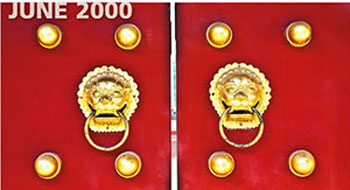THE ROVING DIPLOMAT
TRIBUTE SERIES
TWIN SUPERPOWERS IN ASIA
China and India are venturing beyond the regional sphere to the world

Recent developments in Asia seem to presage significant changes in the power politics of the subcontinent. Political and diplomatic initiatives by India and China in the recent past indicate that the two Asian powers are moving beyond the regional sphere and into the global arena.
These changes can be inferred from the postures, initiatives and statements made by their leaders in recent times, which represent new approaches in their diplomacy and possibly reflect global aspirations.
For India, the most sensational development is the growing support among the big powers for its bid for a permanent seat on the UN Security Council (UNSC). This suggests that its nuclear tests are no longer viewed as a disqualification.
India’s defence minister made a statement to the press to this effect, saying that countries that were maintaining a distance from India were now supporting its case. They include France – which indicated during the visit of the Indian president that it will support its candidature – while Britain’s foreign minister Robin Cook called India a natural contender and the US Ambassador to India affirmed that the United States will give serious consideration to India’s candidature.
Understandably, there’s been a note of dissent from Pakistan. Dismayed by the flurry of support for India, it has condemned the latter as unfit for a seat on the UNSC on the grounds that it has reneged on the council’s resolutions of 1948 and 1949 pertaining to Kashmir.
While the matter is still under discussion at the UN, India seems confident that a decision in its favour will be forthcoming in view of what it described as a change in Western opinion on the nation.
Equally significant are the rounds of talks that India has been holding with a number of countries in recent months. There was the visit of Cook to New Delhi, which he described as a demonstration of the strong and deepening ties between the two countries, as well as the recognition that India was heading towards being a 21st century superpower.
The talks between the two foreign ministers covered the Comprehensive Nuclear-Test-Ban Treaty (CTBT) that Britain urged India to sign, and the situation in Kashmir on which the British foreign minister called for restraint and serious dialogue. Both ministers agreed to engage in formal dialogue between the two countries on non-proliferation and disarmament.
During his visit, Cook highlighted the economic relations between the two nations where Britain’s largest overseas development programme was in India while the UK’s trade with the former was worth UK£ 3 billion.
Another important foreign visitor was the State Secretary of the German Foreign Ministry who primarily visited over the matter of India’s candidature for the UNSC but indicated it was about the resumption of normal relations. The German dignitary was very hopeful about future relations with his nation and referred to the visit of the German foreign minister in May as marking a “German year in India.”
A landmark in India’s relations with foreign states will be the visit by Russian President Vladimir Putin, which is scheduled for the first half of October. The object of the visit is to sign a strategic dialogue between the two countries on security interests, which will include the military and political situation in South and Central Asia, as well as the problem of terrorism.
The scope of these talks will also cover cooperation in nuclear energy and military matters, all of which will strengthen the longstanding partnership between the two countries.
The current diplomatic drive by India is also linked to its defence and armament policies to source markets for homemade products, and meet its own military needs. One such instance was the visit of the French defence minister to discuss arms supplies from France to India that could include naval equipment with (French made) Mirage combat aircraft.
During a recent visit to Malaysia, India’s Minister of Defence expressed an interest in exporting light and advanced attack helicopters to his country, and cooperating with the latter to ensure security in the Indian Ocean and Bay of Bengal.
At the same time, Vietnam is reported to be interested in entering into joint ventures for producing missiles and small arms while Poland has proposed similar cooperation in weapons production with a view to marketing them in Southeast Asia.
For India, the most sensational development is the growing support… for its bid for a permanent seat on the UN Security Council



